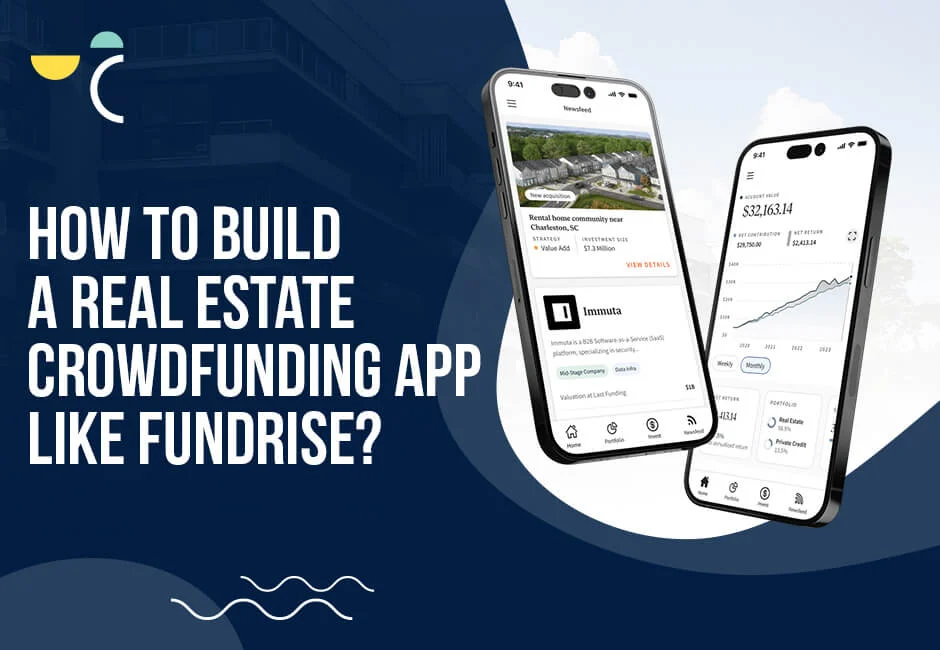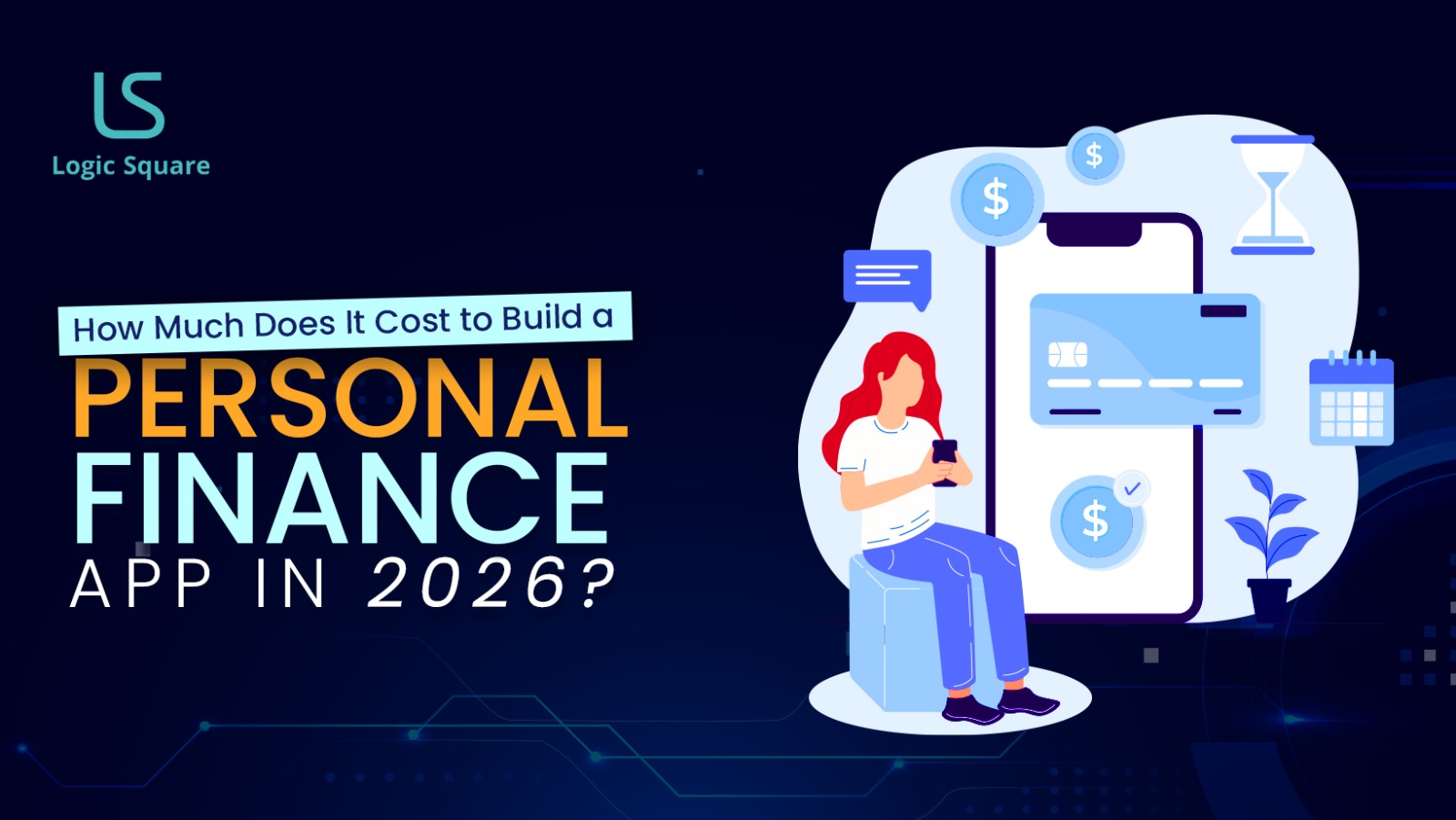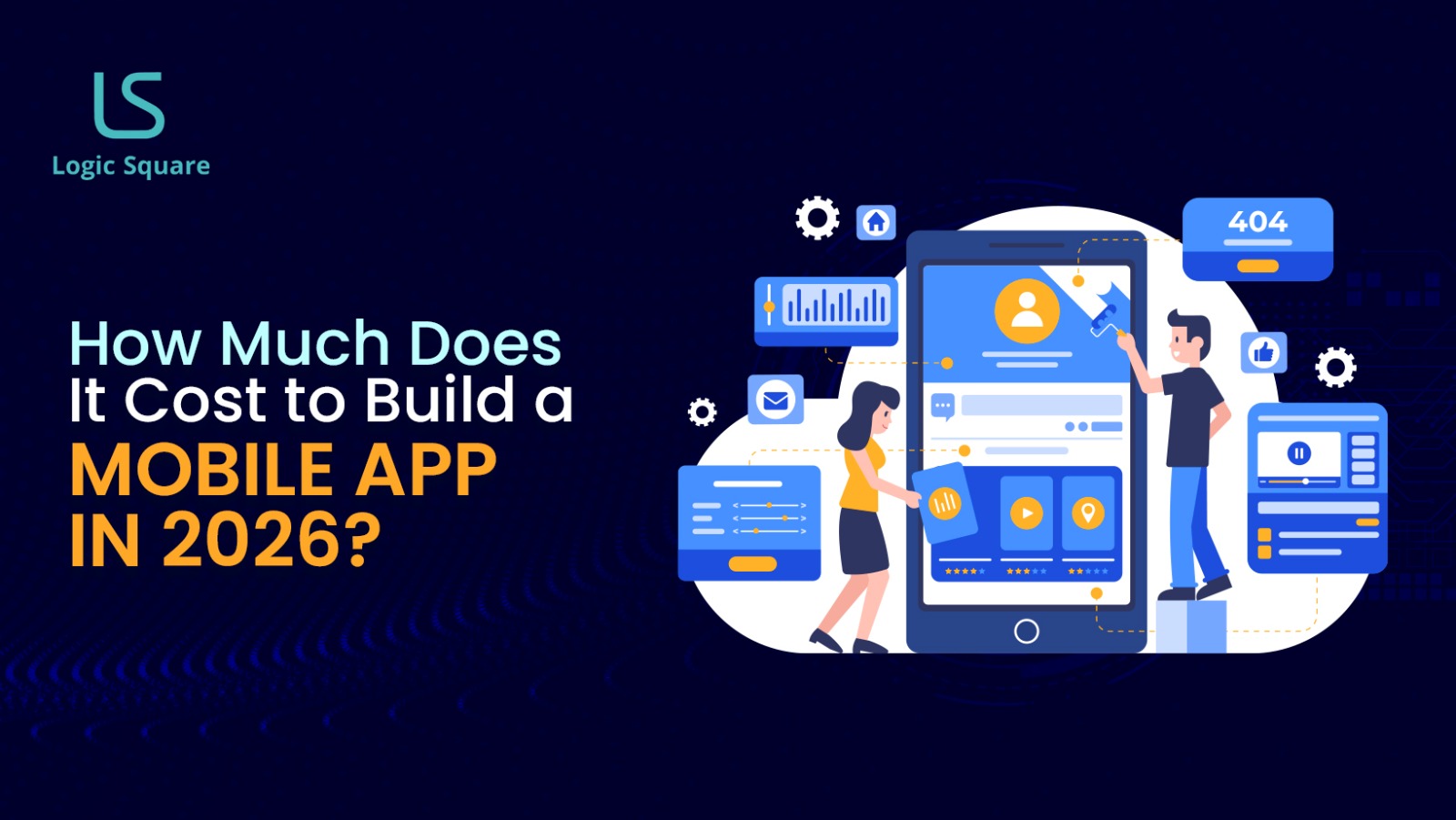Are you familiar with the concept of real estate crowdfunding? It is the most transformative force behind democratizing investors’ participation in real estate ventures. The concept emerged around 2006-2007 and is now a billion-dollar industry. This concept paved the way for building real estate crowdfunding platforms, making real estate investing accessible to a broader audience with lower investment minimums.
The global real estate crowdfunding market is expected to reach around $43 billion by 2027, indicating a significant growth trajectory. With this in-depth guide’s help, you will learn how to develop a real estate crowdfunding app like Fundrise, a frontrunner in this sector. So, let’s get started with this blog.
Table of Contents
ToggleWhat Is A Real Estate Crowdfunding App – A Brief Overview
A real estate crowdfunding app is a platform that bridges the gap between investors and promising real estate projects. These apps provide investors with opportunities to invest in various real estate assets. In addition, these apps give realtors a chance to pool capital from a diverse group of individuals. The app offers features that leverage advanced technologies like data analytics and machine learning to streamline the process of raising money & acquiring properties.
There are mainly two types of real estate crowdfunding apps: equity-based crowdfunding platforms and debt-based crowdfunding platforms. Equity-based crowdfunding platforms provide investors with finances to own a real estate property. On the other hand, debt-based platforms give loans to realtors for real estate projects.
One of the real estate platforms that emerged as a leading player in this sector is Fundrise, founded in 2012; it is the most successful real estate crowdfunding brand. It is one of the prime examples of a real estate crowdfunding app with more than 1,40,000 active users. It is a prominent real estate crowdfunding platform that initiated this innovative approach.
Fundrise has started encouraging average investors to engage actively in real estate projects while diversifying their portfolios. The success of Fundrise has made the real estate crowdfunding app a lucrative business venture.
Why Should You Invest In Building A Real Estate Crowdfunding App?
Before investing in an app development, you should ask yourself why you put your money into starting a real estate crowdfunding platform. The remarkable growth of real estate crowdfunding apps has been extraordinary in the last couple of years. Data from Allied Market Research reveals that the real estate crowdfunding market is about to reach a staggering $157.2 billion by 2030, with a CAGR of 16.4% from 2021.
This outstanding growth is driven by a number of factors, including:
- Increasing demand for alternative investment options in the real estate industry
- Technological innovations in the crowdfunding apps that facilitate seamless transactions.
- Growing awareness regarding the potential benefits of real estate crowdfunding.
- The demand for passive income is always high, and the real estate sector has been a proven source of enhancing passive income.
- The rapid growth in global real estate projects makes realtors seek many potential investors besides financial institutes or banks.
As we can see, building a real estate crowdfunding app is undoubtedly the most rewarding and exciting business idea for 2024.
How Real Estate Crowdfunding Platforms Function?
Real estate crowdfunding involves multiple stakeholders, including project sponsors, investors, and third-party service providers. The working of a real estate crowdfunding platform has the following process.
- Platform Registration:Investors and developers register on the platform and create their accounts.
- Project Submission:The app allows realtors to submit their proposals with detailed project information containing property details, financial projections, and investment terms.
- Project Scrutiny:The real estate crowdfunding platform conducts a detailed assessment of the submitted projects, which involves evaluating the realtor realtors track record, assessing the property’s potential, and ensuring transactional compliance.
- Project Approval:Approved projects are listed on the platforms, and investors can browse and track appropriate projects for investment.
- Investment:Investors browse and select projects based on their preferences and contribute funds to promising projects and receive an ownership stake.
- Project Execution:Investors browse and select projects based on their preferences, donate funds to promising projects, and receive an ownership stake.
- Returns & Distribution:Once fully funded, the real estate developer executes the project, and investors are regularly updated on the project’s progress through continuous notifications from the app.
Essential Features Of A Real Estate Crowdfunding App
If you want to build a real estate crowdfunding app like Fundrise and compete with it, the first thing to do is prepare a feature list for your crowdfunding app for real estate. Listing out these features will help you launch your MVP as soon as possible among your targeted audience and collect feedback. The below-mentioned list of features will help you develop a real estate crowdfunding app.
1: User Registration & Sign In
Every app has a registration system for first-time users, and the real-estate crowdfunding apps are no different. The app allows investors and real-estate developers to create their accounts by entering the required details, like personal info. Users can then sign in through their social media accounts or email addresses. The user registration of your crowdfunding app must have a two-factor authentication, which requires entering an OTP for sign-in. Also, consider attaching a biometric authentication like fingerprints to this feature.
2: AML & KYC Validations:
Crowdfunding apps must deal with a large volume of real estate transactions daily. So, to make sure these transactions are secured, you need features like AML (Anti Money Laundering) and KYC (Know Your Customers). These features can help you run due diligence on the users to verify their identity and income source. Checking on AML and KYC will enable you to link the users’ bank accounts with the app and authenticate their eligibility against the laws and regulations.
3: Property Listings
The real estate crowdfunding platform is incomplete without listings. The feature showcases all the listed projects with comprehensive details on your screen, including available investment opportunities and asset locations. In addition, the listings also present asset type, expected return, risk profiles, and investment terms. Real estate developers can use this feature to describe their projects and potential investment returns. While creating the listing page, consider building an intuitive search engine to categorize projects based on their estimated holding period, site, reviews, risk-taking, etc.
4: Investment Dashboard
Your real estate crowdfunding app must have a separate dashboard for investors, allowing them to get valuable information about their functional status, return on investment, and overall performance. In addition, the feature displays real-time updates on project progress and financial metrics and provides investors with valuable insights to make informed decisions. To build a real estate crowdfunding app like Fundrise, consider incorporating a one-time investment option in your app dashboard and monthly contribution system.
5: Returns Calculator
Real estate crowdfunding app development should also have an automated returns calculator enabling investors to calculate their earnings, risk probabilities, and investment amounts. It would help if you equipped your returns calculator with an in-built mortgage earning prediction system to help investors make data-driven decisions and analyze vital financial metrics such as ROI percentage, losses, and recoveries.
6: Earnings Withdrawl Mechanism
As investors earn returns on their investments, a seamless and efficient earnings withdrawal mechanism is essential for maintaining investor’s trust and fostering transparency. A real estate crowdfunding platform must have an automated withdrawal mechanism to streamline and expedite the withdrawal of dividends or appreciation, allowing investors to start and manage drawing requests from their accounts. Consider deploying a multi-tiered withdrawal limit to help investors remove smaller amounts with lower fees. The feature should have a real-time withdrawal tracking system as well.
7: Auto Fund Allocation
Developing a real estate crowdfunding app requires an automated fund allocation method that seamlessly distributes funds based on the budget, risk factor, and returns. The feature runs with coded algorithms that ask investors about their financial goals and plans and, depending on the answers, formulate an effective fund allocation strategy and give them preferred listings accordingly.
8: Notification & Alerts
A real estate investment platform like Fundrise must have advanced notifications, and real-time alert features that push notifications about new investment opportunities, project updates, and regulatory announcements. The feature also enables investors and project developers to get alerts for upcoming events, investment deadlines, and allocation of ROI.
9: Customer Support
If you intend to start a real estate crowdfunding platform, you should incorporate an effective customer service or helpline feature enabling you to answer user’s queries. The customer support feature can help investors and realtors talk with the experts anytime. With this feature in your app, you can assist users with basic tasks like resetting passwords and creating profiles. In addition, investors can get valuable insights on how to invest in a particular real estate project. Consider developing a messaging or chat functionality for this feature to facilitate seamless communication between investors, project developers, and experts.
Top 7 Market Leaders In Real Estate Crowdfunding Platforms:
Real Estate Crowdfunding Platform | Total Investment Raised | Number of Funding Rounds | Year of Establishment | Estimated Revenue (2023) |
Fundrise | $1.4 billion | 7 | 2012 | $100 million |
Realty Mogul | $1.2 billion | 10 | 2012 | $80 million |
CrowdStreet | $1.1 billion | 7 | 2013 | $70 million |
Patch of Land | $900 million | 9 | 2015 | $60 million |
EquityMultiple | $800 million | 8 | 2014 | $50 million |
Diversyfund | $700 million | 6 | 2016 | $40 million |
Groundfloor | $600 million | 5 | 2013 | $30 million |
How To Develop A Real Estate Crowdfunding Platform?
To develop a real estate crowdfunding app, the followning steps need to be followed:
1) Define The Goals:
Before creating a real estate crowdfunding app like Fundrise, you must define the purpose of making it. What kind of problems are you going to solve? What type of real estate projects will your platform focus on, and will those projects cater to your accredited and non-accredited investors? At this stage, you must also identify your ideal users and their pain points to determine your app’s target market segment. Defining these aspects will ensure a foolproof plan for your app development.
2) Conduct Competitor Analysis & In-Depth Market Research:
The next stage is identifying your competitors and conducting in-depth research to analyze their strengths and weaknesses. This research will enable you to find gaps in the market. Understanding your competitors and their overall state in the industry will help you get a sharp edge over them. In addition, in-depth market research will help you know the current regulations and legal requirements for running a real estate crowdfunding app.
3) Craft A Compelling User Experience(UX):
After completing the research stage, it’s time to develop an effective UX design for your app. It would help if you considered prioritizing intuitive navigation and a user-friendly interface to create wireframes and mockups. The competitor analysis can provide valuable information about the UX properties of existing real estate crowdfunding apps. To ensure a memorable user experience for the app, try incorporating high-quality project photos and virtual property tours on your app to build trust and attract new investors.
4) Develop Robust Platform Functionality:
Once the UX components are completed, you should start building the features for your real estate crowdfunding app. These features must include a secured payment gateway, robust security protocols, and easy navigation. It would help if you considered integrating features for project due diligence, enabling investors to access detailed financial reports, legal documents, and property evaluations. Your app should also have features allowing investors to connect with developers and ask questions regarding a real estate project.
5) Test To Refine Your App:
Once the platform is developed, conduct thorough beta testing to identify and fix your app’s common errors, bugs, and usability issues. Performing comprehensive QA testing ensures superior functionality of your app without any hindrance.
6) Launch & Promote Your App:
Finally, your platform is ready to launch. To make your platform launch successful, you should develop a comprehensive marketing strategy to reach your target audience. You may leverage techniques like social media, content marketing, and partnerships with existing players to amplify your platform’s presence. You can offer competitive investment terms and attractive incentives to attract users.
How To Monetize Your Real Estate Crowdfunding Platform?
While real estate crowdfunding platforms provide valuable services to both investors and developers, they also stand to generate significant revenue through various mechanisms. Here are some critical ways you can monetize your real estate crowdfunding platform.
#1 Platform Fees:
Platform fees are charged to developers by the real estate crowdfunding platforms for listing their projects on the platform. These fees can be a flat fee or a percentage of the total investment raised by the developers. You can charge platform fees in the form of transaction fees, management fees, or subscription fees.
Quick Insight: Fundrise charges 0.85% annual management fees from the investors as platform fees. CapitalRise, another leading debt & equity crowdfunding platform, also charges transaction fees to property developers for raising funds through the platform.
#2 Interest Income:
Develop your monetization strategy around interest income by offering debt crowdfunding on your platform. You can earn an interest income on the loans they originate. In addition, you may allow investors and developers to trade or invest on a secondary market and earn interest fees on completed transactions.
Quick Insight: LendingClub, a prominent real estate fundraising platform, focuses on debt crowdfunding, allowing investors to lend money to realtors and project developers and earn interest on loans. LendingClub’s primary revenue source is the interest on these loans, though they also charge origination and servicing fees.
#3 Income Through Offering Additional Services:
Many real estate crowdfunding platforms provide co-investment or advisory services to investors and project developers. These additional services include offering co-investment to investors for a particular project, potentially earning a share of the profit. You may also earn income by providing due diligence or marketing assistance.
Quick Insight: Fundrise allows investors to invest through their IRA by partnering with Millenium Trust Company. However, it charges $125 annually from investors to explore this option.
#4 Performance-Based Incentives:
Your real estate crowdfunding platform can also earn through a percentage of profits garnered from successful investments. Some platforms may also structure their fees based on achieving specific project goals, incentivizing them to work towards successful exits.
Quick Insight: The prime example of earning through performance-based incentives is Fundrise. This platform offers a unique “eShares” structure where investors make dividends based on the underlying property’s net operating income (NOI). Additionally, they can receive a “performance fee” if the property sells for a profit, incentivizing the platform to select and manage high-performing investments.
Factors Influencing Earnings Of Your Real Estate Crowdfunding Platform:
- Platform Size & Activity: If you have a larger real estate crowdfunding platform with a higher volume of investments and transactions, you will generate higher revenue.
- Fee Structure:The fee structure or the choice of monetization model will influence the revenue potential of your real estate investment platform.
- Types Of Invetment Offered:The types of investment your real estate crowdfunding platform offers can influence your earnings. If your platform provides a broader range of investment options, including equity, debt, and tokenized investment, you can better diversify your revenue streams.
- Value-Added Services:If your platform offers additional services beyond basic investment options, it could generate higher revenue by engaging more users.
- Market Conditions:The overall performance of the real estate market can impact the volume of investment activity and, consequently, platform revenue.
How Much Does It Cost To Build A Real Estate Invetment Platform Like Fundrise?
The popularity of real estate crowdfunding apps is at an all-time high, as the report suggests that the real estate market is expected to reach $850.3 billion by 2024. The cost of developing a real estate crowdfunding app similar to Fundrise depends on multiple factors, such as the development model, app complexity, the feature list, size, location, app development type, and scopes. In addition, like other mobile app categories, design and user experience and the expertise of your app development team contribute to the development cost of a real estate crowdfunding mobile app.
However, you have to consider a few additional factors while determining the development cost of a real estate crowdfunding platform. These factors include legal and regulatory compliance, which involves additional legal counsel and consultant costs. In addition, attracting investors and generating interest in the platform through advertisement and public relations require other expenses for developing a real estate crowdfunding app. The general estimate for creating this app can range between $100,000 and $1,50,000.
How Logic Square Technologies Can Help You Build A Real Estate Crowdfunding App?
Are you ready to participate in the real estate crowdfunding landscape? Choose Logic Square Technologies as your trusted app development partner for developing a cutting-edge and highly secure real estate crowdfunding app.
We provide a comprehensive suite of services that include concept development & feasibility analysis, target audience analysis and market research, and adherence to regulatory compliance. Our experienced development team can help you build your real estate investment app from scratch while deploying cutting-edge technologies to deliver scalable solutions.
We provide end-to-end solutions from integration to data management and testing and deployment. Contact us today to discuss your project, explore possibilities, and discover how Logic Square Technologies can empower your business in real estate investment.
Final Words:
Building a real estate crowdfunding platform like Fundrise is exciting and challenging. Hopefully, this article provides you with adequate insights on how you can create an app that can transform the landscape of real estate fundraising. From strategic planning and flawless execution to choosing the right technology partner, everything plays a crucial role in ensuring the success of your crowdfunding platform.
With an experienced technology development partner like Logic Square Technologies, you can ensure the success of your real estate crowdfunding app. Logic Square Technologies helps you meet the needs of investors and stay relevant in the competitive market. Reach out to us today to build a real estate crowdfunding platform for the next generation.
FAQs :
A real estate crowdfunding platform is a digital space that allows real estate investors, financers, and project developers to raise money for real estate projects and accomplish them more efficiently. These mobile applications provide a user-friendly interface that enables investors to get an overview of real estate projects, conduct scrutiny, and invest seamlessly from their smart gadgets. It also has a faster payment processing mechanism that enables investors to withdraw their ROI earnings.
The cost of building and launching a real estate crowdfunding platform depends on factors such as app functionalities, complexities, locations, scopes, regulatory compliance, etc. An estimated cost for building and launching these apps can range from USD 1,00,000 to USD 1,50,000.
Building an efficient real estate crowdfunding mobile app is necessary for your real estate fundraising venture as it offers substantial benefits:
- It provides a virtual space bridging the gap between investors and project developers. It helps investors and realtors leverage cutting-edge technologies to streamline real estate investment.
- It enables you to develop multiple revenue streams for your real estate crowdfunding business, including platform fees, transaction fees, and additional service offerings.
- A mobile app can boost user engagement through improved customer service, better data collection, and cost-efficient marketing campaigns.
The various types of real estate crowdfunding apps include:
- Equity Crowdfunding
- Debt Crowdfunding.
- Hybrid Crowdfunding.
- Tokenized Real Estate Crowdfunding Apps.
- OZ Crowdfunding.
- Custom Development: Offers complete control, customization, and scalability but requires higher upfront costs and longer development time.
- SaaS: It provides a quicker and more affordable launch but may have limitations on customization and scalability.





